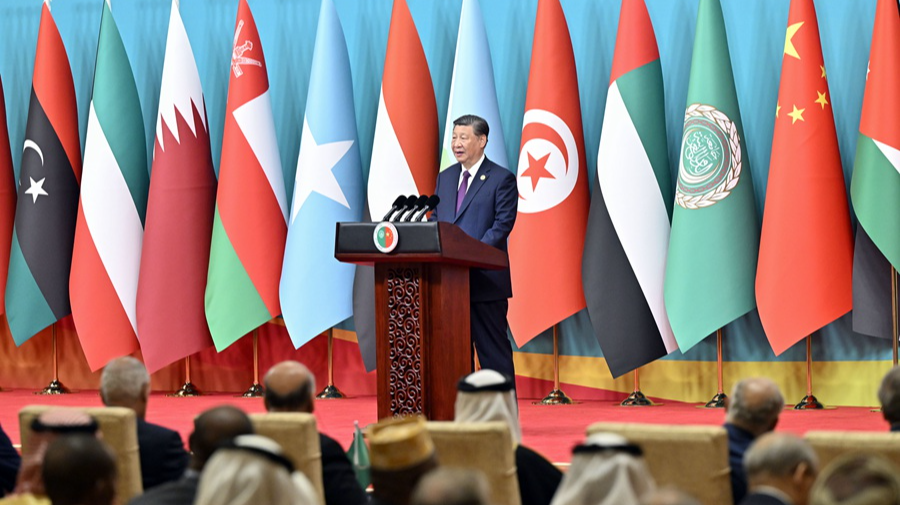Gaza, diplomacy, energy: China’s shadow over the Middle East
Chinese President Xi spoke at the China-Arab States Cooperation Forum in Beijing. The leaders of Egypt, the United Arab Emirates and Bahrain were present. In his address, Xi stressed China’s friendly exchanges and affinity with the Arab world, reiterating his support for a two-state solution to the Israeli-Palestinian conflict. Meanwhile, as the US continues to disengage from the region, China is boosting its presence.
Beijing (AsiaNews) – Chinese President Xi Jinping spoke at the China-Arab States Cooperation Forum in Beijing today.
In his address, he said that the war in the Middle East, in particular, the fighting in Gaza, cannot continue “indefinitely” in the absence of justice. This is why it is now even more urgent to promote a more “broad-based” peace conference.
The forum provided the Chinese leader with an opportunity to focus on the tragedy that is unfolding in the Gaza Strip, with the civilian population paying a very high price for the war between Israel and Hamas.
With the presence of Egyptian President Abdel Fattah al-Sisi, UAE President Sheik Mohammed bin Zayed Al Nahyan, and Bahraini King Hamad bin Isa al-Khalifa, the event was another sign of China’s growing diplomatic and economic involvement in the region.
In his speech, Xi mentioned the "friendly exchanges along the ancient Silk Road" of the past, which are reflected today in a "deep sense of affinity" with the Arab world, which can “enhance strategic cooperation” between the two sides in financial matters and technology.
Announcing a second Sino-Arab summit in 2026, Xi Jinping called for a peace conference to end the war in Gaza open to all parties in the region.
“The war cannot continue indefinitely, justice cannot be permanently absent, and the two-state solution cannot be shaken arbitrarily,” Xi said, in line with China’s long-standing call for two states, one Israeli and one Palestinian, side by side.
Xi reiterated China's support for an independent Palestinian state, calling for a "more authoritative and more effective" peace conference on the Israel-Gaza war.
According to the Chinese leader, relations between China and Arab countries must represent a model for global peace and stability in which “fairness and justice are the foundation of lasting security”.
Addressing the leaders of Bahrain, Egypt, and the UAE, he assured them that China will continue to support a response to the humanitarian crisis and post-conflict reconstruction in Gaza.
A little more than a year ago, China, whose activism in the Middle East is counterbalanced by the progressive disengagement of the United States, the hitherto dominant power, marked the so-called Pax Iranica-Saudica with a meeting of foreign ministers in Beijing.
Saudi Foreign Minister Prince Faisal bin Farhan al Saud and his Iranian counterpart, Hossein Amir-Abdollahian, who died recently in a helicopter crash with Iranian President Ebrahim Raisi), discussed several issues, including security cooperation, as well as direct flights and visas (for pilgrims as well). Their final joint communiqué stated that both would help “create security, stability and prosperity” in the region.
Greater cooperation between China on the two main Arab Gulf countries, Saudi Arabia and the United Arab Emirates, is a sign of a broader geopolitical shift with implications that go beyond the Middle East.
The ongoing negotiations between Beijing and Riyadh for Saudi entry into the BRICS, the group of emerging world economies originally formed by Brazil, Russia, India, and China, are also part of this perspective.
The fifth BRICS member is South Africa, with Egypt, the UAE, Ethiopia, and Iran joining on 1 January 2024.
Officially, nothing has been decided, but it is only a matter of time and strategy, also because Saudi Arabia has been one of the staunchest allies of the United States and partner with the G7.
Joining BRICS could further shake up a global order that is now more than ever under strains from wars and tensions, from Gaza and Ukraine to Taiwan and the South China Sea, not to mention Africa, which has also long been targeted by Chinese companies.
Energy is one of the main reasons China is investing in the Middle East, essential to support domestic industry and economic development, and avoid using domestic energy sources, especially coal, with its negative impact on the environment.
This explains China’s presence in Iraq where Chinese companies were the only foreign players to win five bids, taking licenses covering 10 oil and gas fields.
A total of 29 projects are available, aimed at ramping up output for domestic use.







.png)










